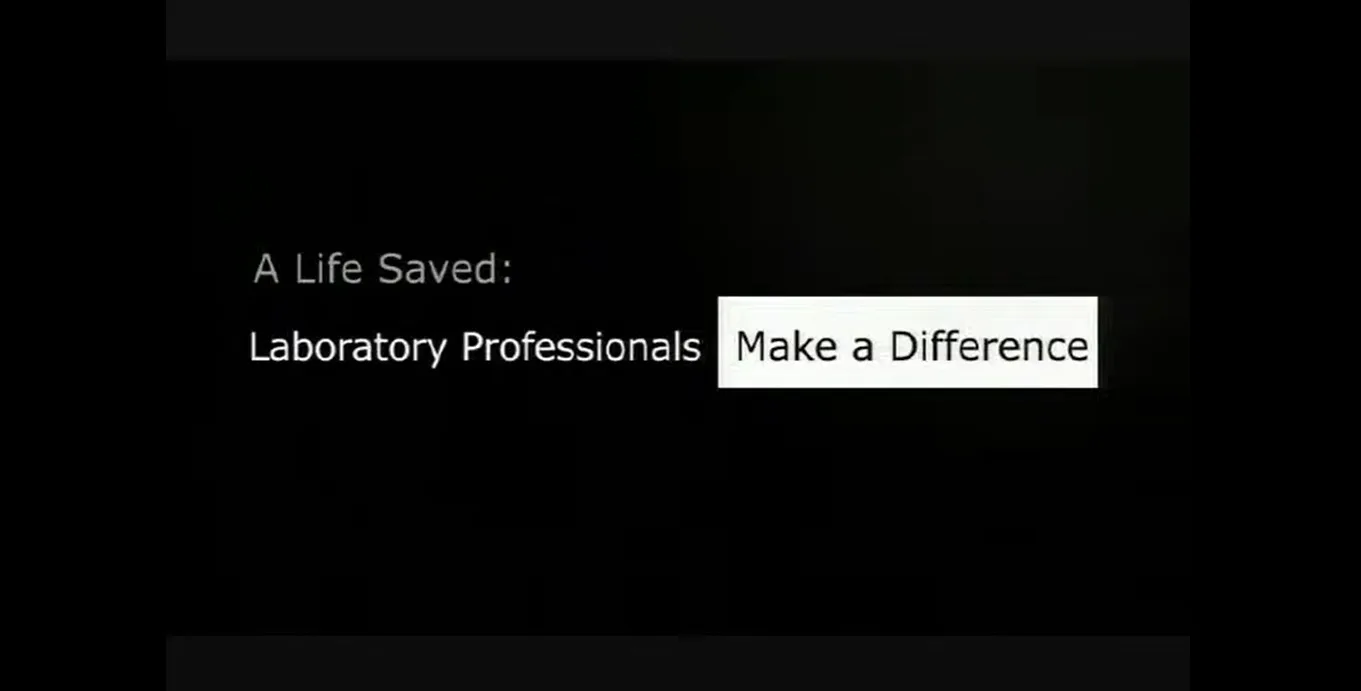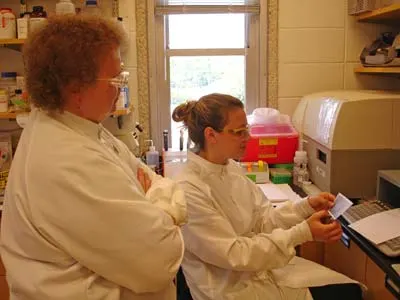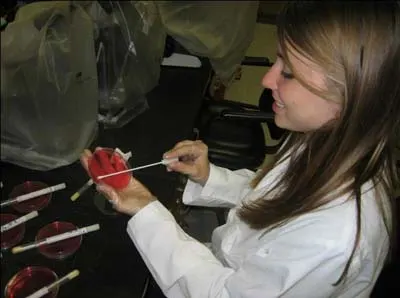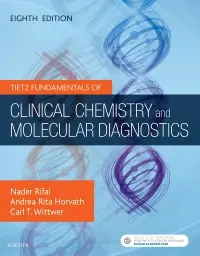The hidden profession that saves lives
April 20, 2020
By Rodney E Rohde, PhD

Medical Laboratory Science (also called Clinical Laboratory Science) is one of the most under-recognized health professions – with excellent job prospects
Caption: A Clinical Laboratory Science class at Texas State University (Photo by Chandler Prude)
As an undergraduate microbiology major and MS student in virology, I envisioned a career in the clinical laboratory at some exciting hospital conducting microbiological testing identify disease-causing microbes.
After graduating and starting my job search, I quickly learned that I was mistaken. To conduct diagnostic laboratory testing in a clinical environment, like a hospital laboratory and most reference laboratories (which provide services for physicians), I needed to be certified or licensed as a medical laboratory scientist (MLS) or medical laboratory technician (MLT).
After learning that I would be unable to work in a hospital laboratory, I decided to go to work for the Texas Department of State Health Services (DSHS) opens in new tab/window in the Bureau of Laboratories opens in new tab/window as a public health microbiologist. I worked in a variety of areas, including newborn screening and virology.
Later, I was a molecular epidemiologist for the DSHS Zoonosis Control Division opens in new tab/window, where I became sort of a hybrid employee between the laboratory and in the field tracking zoonotic disease agents (for example, rabies, hantavirus and plague) as a molecular epidemiologist. It was a fantastic experience and provided a strong foundation for the span of my career. I was one of the original members of the successful Oral Rabies Vaccination Program opens in new tab/window in Texas that eliminated wildlife rabies from coyotes and foxes in the 1990s. I also worked with the Centers for Disease Control (CDC) opens in new tab/window to establish the DSHS Regional Rabies Typing Laboratory opens in new tab/window as the first state public health laboratory to provide rabies typing for other states and countries.
It was in the DSHS laboratory that I first became acquainted with a "med tech" and what his educational background and profession involved.
Medical laboratory science involves diagnostic laboratory testing from A to Z. These professionals do everything from providing your cancer testing results, to predicting the correct antibiotic to prescribe, to typing the correct blood for surgery. MLS professionals provide answers to life-and-death decisions every day.
What is a Medical Laboratory Professional?
Medical Laboratory Scientists (MLS) and Medical Laboratory Technicians (MLT) — also known as Clinical Laboratory Scientists (CLS) — perform laboratory tests on patient samples to provide information needed to diagnose or monitor treatment. Examples of common laboratory tests include tests to detect anemia, diagnose diabetes and strep throat, and provide a transfusion to an accident victim.
Professional duties include:
Operating computerized instruments
Identifying abnormal cells
Assuring safe transfusion of blood products
Culturing and identifying bacteria and viruses
Correlating test results with patient's condition
Selecting and evaluating lab equipment
Selecting, orienting and evaluating employees
Monitoring the quality of testing
Source: NAACLS Standards for Accredited and Approved Programs
I was fascinated – and disappointed – that I had not learned of this amazing career choice (and major) while I was in college. In fact, I was right across the street from an MLS program while I was obtaining my microbiology and virology degree.
This is an important thing to mention because MLS as a college major is often in an Allied Health program or the College of Health Professions, not in the College of Science where my microbiology courses were.
As MLS program chair, I have had so many students and alumni tell me: "If only I had known about the MLS major sooner."
In our program, about 40 percent to 50 percent of students who apply to our major already have a BS, or even an MS or PhD, in another major (such as microbiology, biology or biomedical studies), but they are either unable to find a job or they find out they can't work in a clinical laboratory without the degree and MLS certification.
In my case, I quickly became fascinated with the profession while working with so many wonderful medical lab scientists and medical lab technologists at DSHS. I learned that I could use my virology experience to get credit toward my certification, and went on to obtain my Specialty in Virology (SV) from the Board of Certification (BOC) of the American Society for Clinical Pathology opens in new tab/window (ASCP). The BOC is the primary certification agency for the medical laboratory profession. Eventually, after moving into academia, I acquired my Specialist in Microbiology (SM) and Molecular Biologist (MB) by the same route.
MLS professionals provide up to 70 percent of patients' laboratory testing to physicians so they can provide an accurate diagnosis and treatment plan, according to a 2002 study in Clinical Leadership and Management Review titled "The Value of the Laboratory Professional in the Continuum of Care.

Callie Megan Wright, MS, MLS, MB (ASCP)CM is a Texas State University alumna from 2009. She works at Clinical Pathology Laboratories in Austin, Texas, where she is responsible for setting up and evaluating molecular diagnostic tests and quality control.
In that study, author Rodney Forsman opens in new tab/window, Administrative Director Emeritus of the Mayo Clinic Medical Laboratories and President of the Clinical Laboratory Management Association, stated that 94 percent of the objective medical data in the patient record comes from the laboratory professionals.Doctors rely on laboratory test results to make informed patient diagnoses. Patient history along with physical signs and symptoms are vital, but most diagnoses need confirmation that only laboratory tests can provide. The laboratory professionals also contribute to wellness testing, guiding treatment, and monitoring patient progress.
Video: 'A Life Saved'
This video by the American Society for Clinical Laboratory Science (ASCLS) opens in new tab/window tells the story of how medical laboratorians save lives by assisting with patient diagnosis and treatment:
A Life Saved

Watch now
|
A Life Saved
People often think their lab tests are done by their doctor, like it's done on House, or Dr. Kildare or Grey's Anatomy. In fact, you would probably not want your personal physician to do your lab tests because the specialized skills required are not an integral part of the medical school curriculum.
In a 2008 report in the Annals of Clinical Biochemistry opens in new tab/window, authors Victoria Khromova and Trevor Gray of Northern General Hospital in Sheffield, UK, reported that the junior doctors they surveyed were more confident in their knowledge of when to request tests than in their ability to interpret the results. In fact, 18 percent of them said they would order a lab test without knowing how to interpret the result. The authors concluded that the elimination of pathology and laboratory medicine from the curriculum in many medical schools is jeopardizing patient safety.
Ask your physician, nurse, pharmacist or biology graduate about Vitamin C acting as interference in glucose and triglyceride testing, or causes of false positives in pregnancy testing, or World Health Organization (WHO) classifications for Hodgkin disease and diagnostic criteria, or ways to test for swine flu (H1N1) and avian flu (H5N1), or genetic testing modalities for cystic fibrosis, or who is most likely to show antibodies to Kell during a STAT emergency test for life-saving blood in surgery, or any other critical laboratory test and its interpretation. These aspects of lab testing are generally not in the body of knowledge of any of these medical professionals, and yet it is completely in ours.
Formal coursework training in medical laboratory testing comprises a small portion of the curriculum for physicians, nurses, pharmacists, physical therapists, occupational therapists, and biology graduates. However, for MLS and MLT students, medical laboratory theory for all 1,000+ available lab tests, sources of interference, and connections between test results and diagnoses is the main focus of their studies.
My colleague Dr. Mary Ann McLane, Professor in the Medical Laboratory Sciences Department at the University of Delaware and Past President of the American Society for Clinical Laboratory Science (ASCLS), emphasized the value of their expertise to the patients:
Medical laboratory scientists are on the cutting edge of determining — by evidence-based practice — the most useful, time-efficient, safest, least costly diagnostic tests to be used for your health care. They are involved in the research needed to bring the best that science and technology can offer into the realm of diagnostic reality, all for the benefit of the patients we serve.
To that end, over 50 MLS professionals from ASCLS volunteer to answer questions daily about lab test results for both patients and clinicians through Lab Tests Online, which has been has been run by the American Association for Clinical Chemistry (AACC) since it was launched in 2001.
Through this service, Dr. McLane said, "over 140,000 questions have been answered, saving many lives, relieving confusion about what such tests may mean, and offering follow-up questions for the next clinician visit."
"Lab Tests Online has given a public face to the practice of laboratory medicine," said Executive Producer George Linzer, "and with the support of ASCLS' consumer response network, it has begun to give more public recognition to the valuable work of the laboratory professional."

Professor Mary Ann McLane, PhD, MLS (ASCP)CM, works with Sarah Greenwood when she was a student in the Medical Laboratory Sciences Department at the University of Delaware. Greenwood has a BA in Biological Sciences. (Photo by Kathy Atkinson)
About 7.25 billion laboratory tests are conducted annually in the US, according to the Centers for Medicare & Medicaid Services opens in new tab/window. And yet most in the general public have no understanding about our profession and the critical services we provide daily.
You can learn more about our profession and its importance for patients on the ASCLS page Promote the Profession.
For patients, be an advocate for your own health and wellbeing by making sure your laboratory testing is being conducted by a qualified medical laboratory professional, by asking your health-care team about what your laboratory results mean and by visiting labtestsonline.org opens in new tab/window. You might just be surprised at how much you can learn by understanding your laboratory tests and the professionals who provides that expertise.
How do you become a Medical Laboratory Professional?
Medical laboratory scientists (also known as medical technologists or clinical laboratory scientists) must have a BS degree in medical technology or one of the life sciences.
Medical laboratory technicians must complete a two-year associate degree with similar courses and clinical practicum as the BS degree, but with less emphasis on highly complex laboratory techniques.
To work as either a medical laboratory scientist (MLS) or technician (MLT), you need to be certified by the Board of Certification (BOC) of the American Society for Clinical Pathology (ASCP) opens in new tab/window once you have a degree.
The best way to prepare for the certification exam is to complete an NAACLS opens in new tab/window accredited program or clinical internship in medical technology. These programs prepare students with a combination of lectures and clinical rotations in hematology, clinical chemistry, microbiology, mycology, parasitology, immunology, immunohematology (blood bank), and sometimes genetics. They are offered through hospitals and universities and take from two to four years to complete.
To work in some states (such as New York, Florida and California) you'll also need to be licensed. The license is usually obtained after sitting for the ASCP exam. Upon passing, you can then apply for the license.

Rebecca Denham, MPH, MLS (ASCP), is a Texas State CLS alumna from 2008. She is currently working at the Blood and Tissue Center of Central Texas in Austin, where she was recently promoted to Laboratory Manager. (Photo by Chandler Prude)
It's very important to understand the requirements of a particular state you will work in versus where you obtain your degree. For example, once students in our CLS program at Texas State University opens in new tab/window finish our degree and pass the MLS (ASCP) exam, they are able to work in any clinical laboratory in Texas. However, if our students move to California, there may be restrictions on their scope of work until they satisfy the state's requirements to work in a clinical laboratory.
Learn more
There are various categorical and specialty certifications from ASCP (and other certification agencies) that will allow different "routes" to obtaining these credentials. ASCP has a free procedures booklet with information on the different routes to certification, how to register for certification, and how to maintain certification with continuing education. For a complete description of all the routes and requirements, visit the ASCP Board of Certification website opens in new tab/window.
You can learn about this profession and its importance for patients on the ASCLS page Promote the Profession opens in new tab/window.
Also, you can do a Web search for your area and "medical laboratory scientist" or "medical technologist" or contact the National Accrediting Agency for Clinical Laboratory Sciences (NAACLS) opens in new tab/window. It would also be helpful to visit with an advisor at a local medical laboratory or college.
Sources: N opens in new tab/windowational Accrediting Agency for Clinical Laboratory Sciences (NAACLS) opens in new tab/window and American Society for Clinical Pathology (ASCP) opens in new tab/window
Is this profession right for you?
Consider this profession if you:
Have a strong interest in science
Want a career in health care with minimal patient contact
Like challenge and responsibility
Like to solve problems
Are a team player
Work well under pressure
Are self-motivated
Enjoy working with computers
Are detail-oriented
Are willing to persevere to find the right answer
What are the job prospects?
The profession is growing "much faster than average," according to the US Bureau of Labor Statistics opens in new tab/window, with a 22 percent increase in employment projected from 2012 to 2022 – twice that of all other occupations. At Texas State University, the job placement rate for students has been 90 percent to 95 percent for the past decade, with most of the remaining students going to graduate school, according to Dr. Rohde. At the University of Delaware, Dr. McLane reports a similar scenario, with a job placement rate of 90 percent to 98 percent. They said students typically receive one or two job offers in their final semester while doing their clinical internships.
This situation is similar in may parts of the US, according to the American Society for Clinical Laboratory Science (ASCLS) opens in new tab/window, which states: "Currently there is a shortage in many parts of the US,meaning that graduates can expect employment and higher salaries."
How much can you earn?
The salary for laboratory professionals varies according to their level and location. According to the American Society for Clinical Pathology (ASCP) 2013 Wage Survey of Clinical Laboratories in the United States, the staff level MT/MLS/CLS national average is $56,430 per year and $77,113 per year at the supervisory level. Salaries are higher for those who become lab directors or faculty members. The full ASCP report is here.
According to PayScale.com, which gathers its information from individual user reports: "A Mid-Career Medical/Clinical Laboratory Technologist earns an average of $22.40 per hour. The skills that increase pay for this job the most are PCR Analysis and Molecular Biology."
Related resources
ASCLS Career Center
Laboratory Medicine – a National Status Report, for the CDC
Elsevier's textbooks on Clinical Laboratory Science
Elsevier publishes many textbooks for Clinical Laboratory Science. Some of the most popular are:
Tietz Fundamentals of Clinical Chemistry and Molecular Diagnostics opens in new tab/window(7th Edition coming in March), by Carl A. Burtis, PhD and David E. Bruns, MD
Linne & Ringsrud's Clinical Laboratory Science: The Basics and Routine Techniques, 6th Edition opens in new tab/window, by Mary Louise Turgeon, EdD, MT(ASCP), CLS(NCA)
Textbook of Diagnostic Microbiology, 4th Edition opens in new tab/window, by Connie R. Mahon, MS, MT(ASCP), CLS, Donald C. Lehman, EdD, MT(ASCP), SM(NRM) and George Manuselis Jr., MA, MT(ASCP)
Hematology: Clinical Principles and Applications, 4th Edition opens in new tab/window, by Bernadette F. Rodak, MS, MLS, George A. Fritsma, MS, MLS and Elaine Keohane, PhD, MLS
See all of Elsevier's CLS textbooks opens in new tab/window.

Contributor

RERP
Rodney E Rohde, PhD
University Distinguished Chair & Professor, Clinical Laboratory Science (CLS)
Texas State University